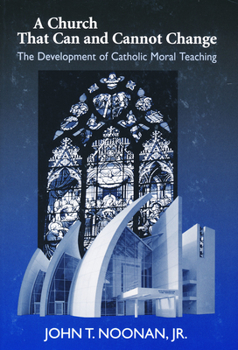A Church That Can and Cannot Change: The Development of Catholic Moral Teaching
Select Format
Select Condition 
Book Overview
Using concrete examples, John T. Noonan, Jr., demonstrates that the moral teaching of the Catholic Church has changed and continues to change without abandoning its foundational commitment to the Gospel of Jesus Christ. Specifically, Noonan looks at the profound changes that have occurred over the centuries in Catholic moral teaching on freedom of conscience, lending for a profit, and slavery. He also offers a close examination of the change now in progress concerning divorce.
In these changes Noonan perceives the Catholic Church to be a vigorous, living organism answering new questions with new answers, and enlarging the capacity of believers to learn through experience and empathy what love demands. He contends that the impetus to change comes from a variety of sources, including prayer, meditation on Scripture, new theological insights and analyses, the evolution of human institutions, and the examples and instruction given by persons of good will.
Noonan also states that the Church cannot change its commitment to preaching the Gospel of Jesus Christ. Given this absolute, how can the moral teaching of the Church change? Noonan finds this question unanswerable when asked in the abstract. But in the context of the specific facts and events he discusses in this book, an answer becomes clear. As our capacity to grasp the Gospel grows, so too, our understanding and compassion, which give life to the Gospel commandments of love, grow.





